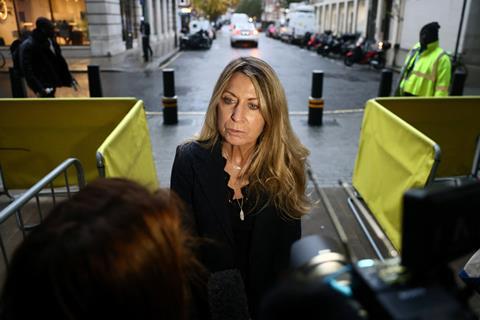The departure of the BBC’s director general and news CEO raise questions about the difference between political gesture and making amends, says George Pitcher. The Christian concept of penance has much to offer

The resignations of the BBC’s director general Tim Davie and News CEO Deborah Turness are a cause of wonderment. I don’t mean that they’re truly amazing – like a miracle, the stars at night or a bird’s nest – but that they’re like a sign or a wonder, in that we struggle to understand what they can possibly mean.
Davie seems to have quit after a string of scandals on his watch, from Huw Edwards to Gary Lineker to the Donald Trump edit fiasco – and, in large part, has perhaps thrown in the towel because he’s had enough. Turness has adopted the “buck stops here” approach, in that she was the big news boss when Panorama broadcast a twelve-second paraphrase of President Trump’s 6 January 2021 speech that made it look like he was calling for the subsequent insurrection at the US Capitol.
Nobody complained about the Panorama programme last year when it aired, and Trump only threatened a $12bn lawsuit after it turned up in a long and tedious report by a disaffected BBC adviser. Meanwhile, it’s obviously not the direct fault of the director general or News CEO (or they might be frantically examining their personal libel insurance); Turness also made it clear that “the BBC is not institutionally biased”.
Some of this will, indeed, be about where the buck stops. You can also throw in a bit about doing the honourable thing. Otherwise, it’s down to an “error of judgment” over the Trump edit - and the implied contrition for it.
Penance and penitence
But what we really need to know is whether the resignations have anything to do with penance on the part of the two who have given up their jobs, or the BBC more broadly - who don’t sound sorry at all. Indeed, there’s a good deal of indignation at the departures within the BBC. So, one wonders why they have resigned. Is there anything to be penitent about?
Penance differs from penitence, which simply means being weighed down with sorrow for having done something wrong. Penance is an action rather than a state of mind and, as such, is one of the seven sacraments of Catholicism and a means of obtaining remission of mortal sins. This may not be top priority for Davie and Turness, unless I’m doing them an injustice (for which I’d be truly sorry).
It’s a bit different for those of us in the Reformed tradition, but the constituent elements of the sacrament for Catholics are contrition, confession and satisfaction. We can’t judge (even if we were entitled to do so, but that’s another discussion) how contrite Davie and Turness are, but they do seem to have confessed - to a degree, at least. The BBC messed up and they’re paying the price.
The most intriguing element, therefore, is satisfaction.
Making amends
That’s the ‘doing’ of penance - an act of atonement or the making of amends. Failure to perform this penitential discipline doesn’t invalidate the sacrament, provided the willingness to do so was there when absolution was pronounced. In other words, actions are promised that show you’re truly sorry.
It may be that the demands of satisfaction are, well, satisfied by the giving up of highly paid jobs and the status that goes with them. But that’s far from clear when the resignation occurs after being caught out, as it were, rather than having been contrite and confessed.
Former deputy prime minister Angela Rayner’s resignation statement over paying an incorrect level of stamp duty on a property deal is a case in point – it was, rather, all a case of the strain on her family.
Penance differs from penitence, which simply means being weighed down with sorrow for having done something wrong
There has been much talk of the qualities needed in a new BBC director general to put its house in order. That has some resonance with the sacramental quality of satisfaction. But it won’t be done by Davie or Turness. Their atonement is limited to giving up their jobs, which is not an inconsiderable sacrifice, but is much more to do with the contrition part of penance.
As I say, I’ve no idea whether these are serious considerations for the two BBC executives. In the absence of any information to the contrary, one might conclude that it’s a very secular matter; a response, perhaps, to the political pressure represented by opposition leader Kemi Badenoch, who demanded that “heads must roll”.
But, at the very least, such considerations demonstrate that tenets of faith are relevant to working life. The sacrament of penance isn’t just an arcane religious rite. Its application brings meaning to public resignations that are otherwise simply grandiose gestures without the required work to bring about long-lasting change.






































No comments yet